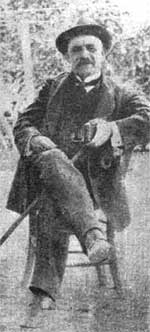
|
Famous people |
||
|
Ioannis Kondylakis
|
| Ioannis
Kondylakis was born in the village of Ano Viannos in 1861. When he was
five years old, he and his family came to Piraeus as fugitives after the
1866 rebellion. He went to school in the Varvakeio School in Athens and
was later enrolled in the Faculty of Arts.
|
|
| For
financial reasons he had to break off his studies and accept a job as a
teacher in a Cretan village, but one year later he gave notice and went to
Chania to concentrate on his literary activities.
|
|
| In
Chania he wrote for the newspaper "Amyna", but his patriotic
articles infuriated the Turkish authorities to such an extent that he had
to flee to Athens.
|
|
| Here
he wrote articles in the newspapers "Estia",
"Asty", "Skrip" and "Embros" under various
pseudonyms. Later he used solely the pseudonym Diavatis (The passer-by).
|
|
| His
journalist career lasted for 25 years, and he became furthermore the first
president of the Union of Editors. He died in Iraklion in 1920.
|
|
| Kondylakis
was a brilliant journalist and is also considered to be the founder of
feature writing in Greece. He was a proponent of the erudite written
language Katharevousa, which he also used in his books except for the
dialogue, where he let his characters speak the Cretan dialect. He wrote
books about Crete and also the following imaginative literature:
|
|
| "Διηγήματα"
(Short Stories) (1884), "Πατούχας"
(Patouchas) (1892), "Οι
άθλιοι των
Αθηνών"
(The Miserables of
Athens) (1895), "Όταν
ήμουν δάσκαλος
και άλλα
διάφορα
διηγήματα"
(When
I Was a Teacher and Other Short Stories)
(1916),"Ενώ
διάβαινα"
(While
I Was Passing By)
(1916), "Η
πρώτη αγάπη"
(The First Love) (1919).
|
|
| One
hundred years after his birth, his complete works were published in two
volumes in 1961.
|
|
| In
his books Kondylakis describes life in the Cretan villages and portrays
his
main characters vividly and with a lot of humour. Some of his short
stories are descriptions of his own life (When I Was a Teacher) and
several of the characters in this book are real people.
|
|
| A
bust of Kondylakis is set up in the square of Ano Viannos, and the
folklore museum of the village has furthermore a small exhibition about
his life and career.
|
|
|
|
|
The folklore museum
|
The Kondylakis exhibition
|